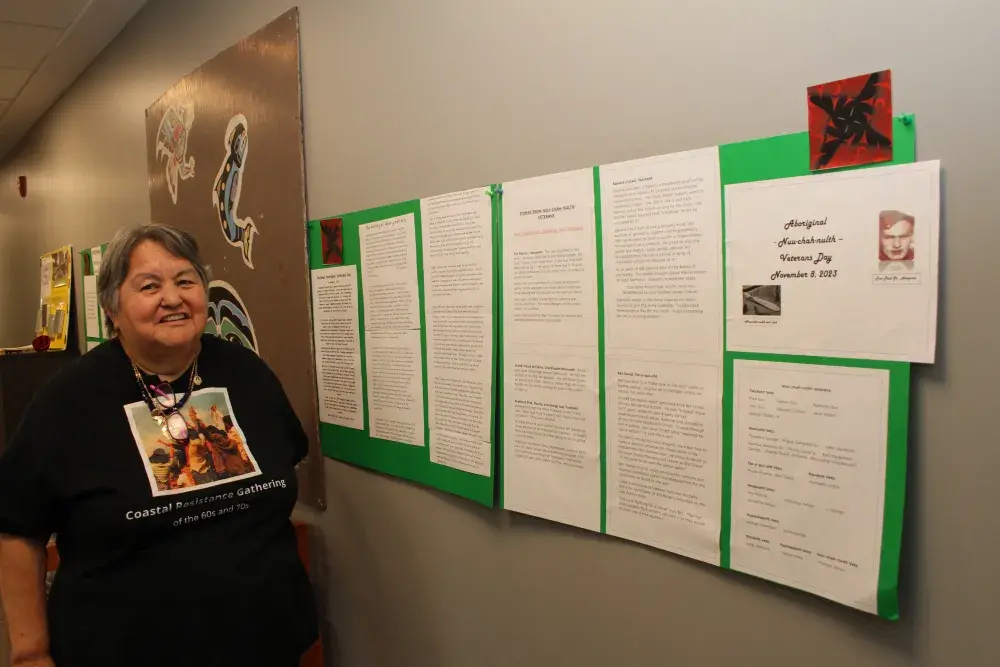Leading up to Remembrance Day on Nov. 11, Canada officially recognizes the role Indigenous veterans have held in international conflicts, an occasion that is about “honouring our ancestors,” says a Tseshaht member.
Today is Indigenous Veterans Day, when the country acknowledges the Aboriginal people who fought for Canada. According to Veterans Affairs Canada, this totaled over 12,000 in the 20th century’s conflicts, with at least 500 losing their lives.
“These determined volunteers were often forced to overcome many challenges to serve in uniform, from learning a new language and adapting to cultural differences, to having to travel great distances from their remote communities just to enlist,” states Veterans Affairs on its website.
Over 20 Nuu-chah-nulth-aht have fought for Canada and the United States in wars, according to a list compiled by Ha-Shilth-Sa, including several members of the Tseshaht First Nation.
“It’s honouring our people, honouring our ancestors,” said Tseshaht member Aaron Watts of Indigenous Veterans Day. “Like we would honour our other ancestors for carrying forward the teachings, through the most difficult of times our war veterans have done something similar where they’ve put their lives on the line for us.”
Despite these sacrifices, in the past Indigenous veterans were often denied benefits and support programs after serving.
Until 1951 an Aboriginal vet wasn’t allowed to share a toast honouring lost comrades in a Royal Canadian Legion, according to Veterans Affairs. At the National War Memorial in Ottawa Indigenous veterans and their families weren’t permitted to lay wreathes or have their own guards until the mid 1990s.
Then, when some died, they were buried under unmarked graves with no mention of their service. In recent years the Last Post Fund and Veterans Affairs has used the Indigenous Veterans Initiative to provide grave markers for service members who have been deceased for at least five years. This fund can also help to add traditional names to veterans’ graves.
As Nov. 11 approaches the Ha-Shilth-Sa has compiled the following list of war veterans:
- Jack (John) Watts, Tseshaht
- Frank Williams, Checklesaht/Ahousaht
- Tim Paul Sr., Hesquiaht
- Earl Maquinna George, Ahousaht
- Edward Clutesi, Tseshaht
- Ramona Gus, Tseshaht
- Phillip Louie Sr, Ahousaht
- John Jacobson, Ahousaht
- George Clutesi Jr, Tseshaht
- Tom Gus, Tseshaht
- Fred Gus, Tseshaht
- Danny Gus, Tseshaht
- Angus Campbell, Ahousaht
- Thomas Jones, Nuu-chah-nulth
- M. Amos, Hesquiaht
- J. George, Hesquiaht
- Andrew Webster Sr., Ahousaht
- Frank Charlie, Tla-o-qui-aht
- Luke Mahone, Ditidaht
- George Hamilton, Hupacasath
- Theodore George, Ahousaht
- Victoria Nancy Joe-Mack, Toquaht
- Henry Vincent Thomas, Tseshaht,
- Jerid Clutesi, Tseshaht
- Lorraine Mundy, Yuułuʔiłʔatḥ
If you know of a Nuu-chah-nulth war veteran who is not included in this list, or who you would like recognized as part of Indigenous Veterans Day or Remembrance Day, please contact Ha-Shilth-Sa at 250-724-5757.

